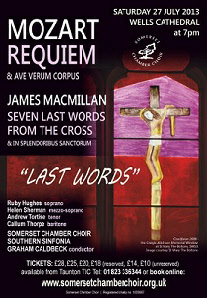



|
|
About |
Concerts |
|
|
|
|
|
www.somersetchamberchoir.org.uk © 2011 Somerset Chamber Choir Registered Charity No.1003687
Patrons: Dame Emma Kirkby and Sir David Willcocks




Sign up for concert updates
Enter your email address here to receive concert details
by email
|
Works: |
Mozart
James MacMillan |
Requiem Ave verum Corpus Seven Last Words from the Cross In splendoribus sanctorum |
|
Performers: |
Somerset Chamber Choir Southern Sinfonia Ruby Hughes Helen Semple Helen Sherman Andrew Tortise Callum Thorpe Howard Rowntree Graham Caldbeck |
Soprano Soprano Mezzo- Tenor Baritone Trumpet Conductor |
Review:
The Somerset Chamber Choir’s annual visit to Wells Cathedral is now a well-
Following a stylish performance of Mozart’s justly popular motet Ave verum Corpus,
the remainder of the first half of the concert was devoted to Scottish composer James
MacMillan’s Seven Last Words from the Cross, a Cantata for Choir and Strings in which
the composer combines the seven last utterances of Christ with excerpts from the
Bible, enabling the listener to experience this ancient text anew. This remarkable
composition conveyed the pain and suffering of the crucified Christ in harrowing
detail, whilst including some surprising moments of beauty and light, perhaps offering
glimpses of the paradise to come. Under the conductor’s skilful direction, this work
could hardly fail to stir the emotions and the music seemed to liberate the furthest
recesses of the vast Cathedral space. The Cantata undoubtedly placed huge technical
demands upon both choir and orchestra, but the performers, including solo singers
and small groups from within the choir, delivered a compelling performance of powerful
intensity whose poignancy was only increased by the extended conclusion for the orchestra
alone, which drew some stunning playing from the players, as the music sought to
portray the final struggle, yet eventual peace, of the dying man. The modern idiom
of this music made it rarely easy to listen to, but this was an intense experience
that I would not wish to have missed -
The choir began the second half with a shorter work by James MacMillan, the communion
motet In splendoribus sanctorum, an intriguing setting of words taken from Psalm
109 which were set in a very simple style for the choir, but its choral phrases interspersed
with a virtuosic trumpet part, dramatically played by Howard Rowntree in the organ
loft behind and above the choir – the huge spaces beneath the Cathedral roof resounded
to these aerial interventions. And so the performers next turned their considerable
abilities to Mozart’s Requiem which, as the programme note reminded us, remains one
of the most daring works of its kind written in the 18th century, and one of the
most powerfully influential works of its period. From the opening Kyrie to the last
great fugue, Cum sanctis, the choir impressed with its mastery of long, difficult
polyphonic phrases, and the combined forces certainly achieved the volume needed
to match the power of the words, which were delivered with ample clarity and precision.
Given that this is a work that is also infused with tenderness, a little more dynamic
contrast within some of the extended sections could, in this listener’s opinion,
have elevated the performance to even greater emotional heights, but there is no
doubt that this was an accomplished and thrilling performance, with choir and orchestra
exploiting their winning partnership to great effect. The four young soloists made
excellent contributions, although I particularly enjoyed the resonant voices of the
mezzo-
Next Summer, the choir will celebrate its 30th Anniversary in Wells Cathedral with
a performance of Elgar’s The Dream of Gerontius, in a joint venture with the German
choir Berliner Kantorei, which is a mouth-
Louise Kirk
Saturday 27 July 2013
Wells Cathedral
Mozart Requiem, James MacMillan Seven Last Words
 Click here to view the concert programme
Click here to view the concert programme